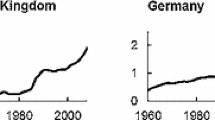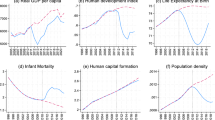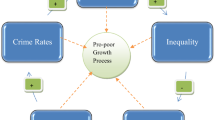Abstract
How has economic openness affected social spending? Are allocations influenced by the partisan preference of the executive branch? In this paper, I test various hypotheses about the determinants of social spending in contemporary Latin America, using a time-series cross-sectional analysis of 17 countries in the period between 1978 and 2006. Contrary to the expectations of critics, I find that trade openness affects social spending positively and governments are compensating citizens exposed to greater economic uncertainty. In addition, I find that partisanship is an important predictor of social spending. Left-wing executives spend more money on social programmes than their right-wing counterparts. This finding is particularly strong when left-wing executives have greater legislative support. In the final section, I re-examine my quantitative findings in a case study of Uruguay.

Similar content being viewed by others
Notes
Alternative estimation techniques including robust regressors (‘rreg’), Prais–Winsten regression, or ML random-effects estimators (‘mle’) did not produce major substantive changes in the reported results or the robustness of the model.
Following Mainwaring and Pérez-Liñán (2005), I include semi-democracies since they face popular pressures absent from authoritarian regimes.
Despite authoritarian political institutions and relatively stagnant economy, Cuba devotes an astonishing 39 per cent of GDP to social programmes. Not coincidentally, Cuban citizens enjoy one of the highest levels of education and health in Latin America.
To standardise measures of social security expenditure across cases, the IMF aggregates social assistance (assistência social, bienestar, asistencia social) and social security (previdência social, seguro social). Scholars of social spending in Latin America call this spending ‘social security’ even though this terminology provokes notions of biased, mal-distributive allocations favouring workers in the formal economy. According to the IMF, this variable includes funds, both private and governmental, allocated in the national budget to poverty, unemployment, maternity leave, retirement, disability, and pension allocations. Also included are expenditures that are not employment- or earnings-based and programmes of a progressive nature, which target the informal sector.
Argentina, Brazil, Ecuador, Nicaragua, Panama, Paraguay, Peru, and Uruguay.
Running separate tests on the IMF and national data did not produce divergent results.
Since social spending/GDP is the most common measurement, I did not include variables for social spending per capita or as a percentage of all government expenditures. Generally, the same patterns hold among alternative measurements (Kaufman and Segura-Ubiergo 2001; Avelino et al. 2005; Segura-Ubiergo 2007).
A lagged dependent variable underestimates the strength of the independent variables, giving greater credence to the results (Achen 2000).
Countries facing greater competition from imports may be more resistant to trade. Pairwise correlations between imports (as a percentage of GDP) and trade openness are highly correlated (0.968), meaning there is little substantive difference between the two variables and both behave similarly within the specified model. Exports are also highly correlated with imports hinting that trade openness is a solid proxy variable for countries dependent on imports or exports.
DOD implies a contractual liability to make principal and interest payments. While the claimant is a non-resident, the variable does not distinguish between multilateral agencies, national governments, or private banks.
According to Coppedge, leftist parties are secular, employ Marxist rhetoric, stress the redistribution of wealth, and advocate a strong role for the state in correcting injustice.
Coalition partners are not included unless the coalition has an obvious enduring quality (for example Uruguay’s Frente Amplio and Chile’s Concertación).
To avoid problems of heteroscedasticity, control variables were logged. The correlation between GDP and GDP per capita is 0.66. While there is mild colinearity between GDP and population (0.81), these variables must be included for theoretical reasons.
Argentina, Brazil, Chile, Costa Rica, and Uruguay.
Although not considered a likely candidate for social policy, Bolivia has emerged as a role model for many developing nations. Between 1997 and 2006, Bolivia apportioned on average 13.39 per cent of their GDP towards social spending.
Some scholars wonder whether or not Uruguay should be categorised as a ‘welfare state’ (Rial 1988; Filgueira 1995).
MERCOSUR (Mercado Común del Sur, Southern Common Market) is a regional political and economic block encouraging greater trade integration among member states. Currently, Brazil, Argentina, Uruguay, and Venezuela have full membership. Bolivia, Chile, Colombia, Peru, Ecuador, and Mexico have associate-member or observer status. Recently, Paraguay was suspended for the ouster of former President Fernando Lugo.
By the end of his administration Batlle cut education spending by 3 per cent, health by 11 per cent, housing by 15 per cent, and social security by 19 per cent.
More information on Juntos available at http://juntos.gub.uy/inicio.
References
Acevedo, Eduardo (1936) Anales históricos del Uruguay, 1894–1915 Vol. VI, Montevideo: Barreiro y Ramos.
Achen, Christopher (2000) Why Lagged Dependent Variables Can Suppress the Explanatory Power of Other Independent Variables, paper presented at American Political Science Association’s Annual Conference (Los Angeles).
Ames, Barry (1977) ‘The Politics of Public Spending in Latin America’, American Journal of Political Science 21 (1): 149–76.
Ames, Barry (1995) ‘Electoral Rules, Constituency Pressures, and Pork Barrel: Bases of Voting in the Brazilian Congress’, Journal of Politics 57 (2): 324–43.
Ascher, William (1999) Why Governments Waste Natural Resources, Baltimore, MD: John Hopkins University Press.
Avelino, George , David Brown and Wendy Hunter (2005) ‘The Effects of Capital Mobility, Trade Openness, and Democracy on Social Spending in Latin America, 1980–1999’, American Journal of Political Science 49 (3): 625–41.
Beck, Nathaniel and Jonathan Katz (1995) ‘What to Do (and Not to Do) with Time-series Cross Sectional Data’, American Political Science Review 89 (3): 634–47.
Beyer, Harald , Patricio Rojas and Rodrigo Vergara (1999) ‘Trade Liberalization and Wage Inequality’, Journal of Development Economics 59 (1): 103–23.
Bogliaccini, Juan Ariel (2013) ‘Trade Liberalization, Deindustrialization, and Inequality from Middle-income Latin American Countries’, Latin American Research Review 48 (2): 79–105.
Boix, Charles (1998) Political Parties Growth and Equality: Conservative and Social Democratic Economic Strategies in the World Economy, Cambridge: Cambridge University Press.
Brambor, Thomas , William Clark and Matt Golder (2005) ‘Understanding Interaction Models: Improving Empirical Analyses’, Political Analysis 4 (1): 63–82.
Braumoeller, Bear (2004) ‘Hypothesis Testing and Multiplicative Interaction Terms’, International Organization 58 (4): 807–20.
Brown, David and Wendy Hunter (1999) ‘Social Spending in Latin America, 1980–92’, American Political Science Review 93 (4): 779–90.
Bucheli, Marisa , Nora Lustig , Maximo Rossi and Florencia Amábile (2013) ‘Social Spending, Taxes, and Income Redistribution in Uruguay’, Policy Research Working Paper 6380, World Bank.
Bueno de Mesquita, Bruce , Alastair Smith , Randolph M. Siverson and James D. Morrow (2003) The Logic of Political Survival, Cambridge, MA: MIT Press.
Burgess, Katrina (1999) ‘Loyalty Dilemmas and Market Reform: Party-union Alliances under Stress in Mexico, Spain, and Venezuela’, World Politics 52 (1): 105–34.
Burgess, Katrina and Steve Levitsky (2003) ‘Explaining Populist Party Adaptation in Latin America’, Comparative Political Studies 36 (8): 881–991.
Carey, John (1997) ‘Institutional Design and Party Systems’, in Larry Diamond ed., Consolidating the Third World Democracies: Themes and Perspectives, 67–92, Baltimore, MD: John Hopkins University Press.
Castiglioni, Rossana (2000) ‘Welfare State Reform in Chile and Uruguay: Cross-class Coalitions, Elite Ideology, and Veto Players’, paper presented at Latin American Studies Association’s Annual Conference (Miami).
Collier, Ruth and David Collier (2002) Shaping the Political Arena, Notre Dame: University of Notre Dame Press.
Collier, David and Anke Hoeffler (2004) ‘Greed and Grievance in Civil War’, Oxford Economic Papers 56.
Comisión Económica para América Latina y el Caribe (2014) CEPALSTAT:Base de Dados, estadisticas.cepal.org/.
Contaduría General de la Nación (CGN) (2010) ‘Presupuesto Nacional Período de Gobierno 2010–2014’, Ley 18.719, (1): 563–595.
Coppedge, Michael (1997) ‘A Classification of Latin American Political Parties’, working paper #244, http://dspace.library.nd.edu/dspace/handle/2305/297 (accessed 1 November, 2014).
Cox, Gary and Scott Morgenstern (2001) ‘Latin America’s Reactive Assemblies and Proactive Presidents’, Comparative Politics 33 (2): 171–89.
Davrieux, Hugo (1987) Papel de los gastos públicos en el Uruguay, 1955–1984, Montevideo: CINVE-EBO.
Departamento Intersindical de Estatísticas e Estudos Socioeconômicos (DIESSE) (2013) ‘Balanço de Greves em 2012’, estudos e pesquisas 66 (1): 1–35.
Dion, Michelle (2006) ‘Globalización, democracia y gasto social’, Política y Gobierno 18 (1): 11–50.
Esping-Andersen, Gøsta (1990) The Three Worlds of Welfare Capitalism, Princeton, NJ: University Press.
Fearon, James (2005) ‘Primary Commodity Exports and Civil War’, Journal of Conflict Resolution 49 (4): 483–507.
Filgueira, Fernando (1995) ‘A Century of Social Welfare in Uruguay: Growth to the Limit of the Batllista Social State’, working paper #5, Democracy and Social Policy Series, Kellogg Institute at University of Notre Dame.
Frieden, Jeffry (1991) ‘Invested Interests: The Politics of National Economic Policies in a World of Global Finance’, International Organization 45 (4): 425–51.
Garrett, Geoffrey (1998) ‘Global Market and National Politics: Collision Course or Virtuous Cycle’, International Organization 52 (4): 787–824.
Garrett, Geoffrey (2003) ‘Capital Mobility, Trade, and the Domestic Politics of Economic Policy’, International Organization 49 (4): 657–87.
Garrett, Geoffrey and Peter Lange (1991) ‘Political Responses to Interdependence: What’s ‘Left’ for the Left’, International Organization 45 (4): 539–64.
Georgetown University (2012) Political Database of the Americas. pdba.georgetown.edu.
Gereffi, Gary and Peter Evans (1981) ‘Transnational Corporations, Dependent Development, and State Policy in the Semi-periphery’, Latin American Research Review 16 (3): 219–28.
Haggard, Stephan and Matthew McCubbins (2001) Presidents, Parliaments, and Policy, Cambridge: Cambridge University Press.
Hicks, Alexander (1999) Social Democracy and Welfare Capitalism, Cornell, NY: Cornell University Press.
Hsiao, Cheng and Baohung Sun (2000) ‘To Pool or Not to Pool? In Panel Data Econometrics: Future Directions’, in Jaya Kirshnakumar and Elvezio Ronchetti eds, Panel Data Econometrics: Future Directions, Papers in Honour of Professor Pietro Balestra, Amsterdam: Elsevier Science B.V..
Huber, Evelyn , Thomas Mustillo and John Stephens (2008) ‘Politics and Social Spending in Latin America’, Journal of Politics 70 (2): 420–36.
International Monetary Fund (2008) Government Finance Statistics, www.imf.org.
Instituto Nacional de Estadística (2006) Empleo Informal en el Uruguay, www.ine.gub.uy.
Johnson, Gregg and Brian Crisp (2003) ‘Mandates, Powers, and Policies’, American Journal of Political Science 47 (1): 128–42.
Karl, Terry Lynn (1990) ‘Dilemmas of Democratization in Latin America’, Comparative Politics 23 (1): 1–21.
Karl, Terry Lynn (1997) The Paradox of Plenty: Oil Booms and Petro-states, Berkeley, CA: University of California Press.
Kaufman, Robert and Alex Segura-Ubiergo (2001) ‘Globalization, Domestic Politics, and Social Spending in Latin America’, World Politics 53 (4): 553–87.
Kingstone, Peter and Joseph Young (2009) ‘Partisanship and Policy Choice: What Left for the Left in Latin America?’ Political Research Quarterly 20 (10): 1–13.
Kitschelt, Herbert (2000) ‘Linkages between Citizens and Politicians in Democratic Politics’, Comparative Political Studies 33 (6/7): 845–79.
Latinobarómetro (2000) Gráficos Informe de Prensa, Santiago: Latinobarómetro.
Linz, Juan (1990) ‘The Perils of Presidentialism’, Journal of Democracy 1 (1): 51–69.
Llambí, Cecilia , Gabriel Oddone , Marcelo Perera and Cecilia Velázquez (2010) ‘Estudio sobre impacto distributivo del gasto público social en Uruguay’, working paper, Notas Técnicas #IDB-TN-189, Inter-American Development Bank.
Levitsky, Steven and Kenneth Roberts (2011) The Resurgence of the Latin American Left, Baltimore, MD: John Hopkins University Press.
Lievesley, Geraldine and Steve Ludlam (2009) Reclaiming Latin America: Experiments in Radical Social Democracy, London: Zed Books.
Luna, Juan and Elizabeth Zeichmeister (2005) ‘Political Representation in Latin America: A Study of Elite Mass Congruence in Nine Countries’, Comparative Political Studies 38 (4): 388–416.
Magaloni, Beatriz and Vidal Romero (2008) ‘Partisan Cleavages, State Retrenchment, and Free Trade’, Latin American Research Review 43 (2): 107–35.
Mainwaring, Scott (1999) Rethinking Party Systems in the Third Wave of Democratization: The Case of Brazil, Stanford, CA: Stanford University Press.
Mainwaring, Scott and Aníbal Pérez-Liñán (2005) ‘Latin American Democratization since 1978. Democratic Transitions, Breakdowns, and Erosions’, in Francis Hagopian and Scott Mainwaring eds, The Third Wave of Democratization, 14–59, Cambridge: University Press.
Mainwaring, Scott and Mariano Torcal (2006) ‘Party System Institutionalization and Party System Theory after the Third Wave of Democratization’, in Richard Katz and William Crotty eds, Handbook of Party Politics, 204–27, New York: Sage Publications.
Martínez, Rodrigo (2011) ‘El Gasto Social en América Latina y el Caribe’, presentation at CEPAL Reunion of Experts, Washington, 6–7 October.
Mesa-Lago, Carmelo (1994) Changing Social Security in Latin America: Toward Alleviating the Social Costs of Economic Reform, Boulder, CO: Lynn Rienner.
Milner, Helen and Benjamin Judkins (2004) ‘Partisanship, Trade Policy and Globalization: Is There a Left-right Divide on Trade Policy’, International Studies Quarterly 48 (1): 95–119.
Morgenstern, Scott and Benito Nacif (2002) Legislative Politics in Latin America, Cambridge: Cambridge University Press.
Murillo, Victoria (2000) ‘From Populism to Neoliberalism: Labor Unions and Market Reforms in Latin America’, World Politics 52 (2): 135–74.
Nooruddin, Irfan and Joel Simmons (2006) ‘The Politics of Hard Choices: IMF Programs and Government Spending’, International Organization 60 (4): 1001–33.
O’Donnell, Guillermo (1994) ‘Delegative Democracy?’ Journal of Democracy 5 (1): 55–69.
O’Donnell, Guillermo (1998) ‘Horizontal Accountability in New Democracies’, Journal of Democracy 9 (3): 112–26.
O’Donnell, Guillermo and Phillipe Schmitter (1986) Transitions from Authoritarian Rule, Baltimore, MD: John Hopkins Press.
Offe, Claus and Helmut Wiesenthal (1980) ‘Two Logics of Collective Action: Theoretical Notes on Social Class and Organizational Form’, Political Power and Social Theory 1 (1): 67–115.
Ohmae, Kenichi (1995) The End of the Nation State: The Rise of Regional Economies, New York: Free Press.
Olson, Mancur (1971) The Logic of Collective Action: Public Goods and the Theory of Groups, Cambridge: Harvard University Press.
Perelli, Carina (1985) El proyecto ideológico batllista, Montevideo: CIESU.
Philip, George and Francisco Panizza (2011) The Triumph of Politics, New York: Wiley Press.
Pierson, Paul (2001) The Politics of the Welfare State, Oxford: University Press.
Przeworski, Adam (1985) Capitalism and Social Democracy, Cambridge: University Press.
Remmer, Karen (2001) ‘Elections in Contemporary Latin America’, in Carol Wise and Riordan Roett eds, Post-stabilization Politics in Latin America, 31–55, Washington: Brookings Institution Press.
Rial, Juan (1988) Estado y políticas de ingresos de Uruguay. Política económica y actores sociales, Santiago: PREALC/LO.
Robinson, William (2004) Theory of Global Capitalism: Transnational Production, Transnational Capitalists, and the Transnational State, Baltimore, MD: John Hopkins University Press.
Rodrik, Dani (1997) Has Globalization Gone too Far?, Washington: Institute for International Economics.
Rudra, Nita (2002) ‘Globalization and the Decline of the Welfare State in Less-developed Countries’, International Organization 56 (2): 411–45.
Rudra, Nita (2004) ‘Openness, Welfare Spending, and Inequality in the Developing World’, International Studies Quarterly 48 (3): 683–709.
Rueschemeyer, Dietrich , Evelyne Stephens and John Stephens (1992) Capitalist Development & Democracy, Chicago, IL: University Press.
Sachs, Jeffrey and Francisco Rodríguez (1999) ‘Why Do Resource Abundant Economies Grow More Slowly?’ Journal of Economic Growth 4 (3): 277–303.
Sayrs, Lois (1989) Pooled Time Series Analysis, London: Sage Publications.
Segura-Ubiergo, Alex (2007) The Political Economy of the Welfare State in Latin America, Cambridge: University Press.
Shugart, Matthew and Stephan Haggard (2001) ‘Institutions and Public Policy in Presidential Systems’, in Stephan Haggard and Mathew McCubbins eds, Presidents, Parliaments, and Policy, 64–103, Cambridge: University Press.
Shugart, Matthew and Scott Mainwaring (1997) Presidentialism and Democracy in Latin America, Cambridge: University Press.
Stiglitz, Joseph (2002) Globalization and Its Discontents, New York: W.W. Norton Company.
Stokes, Susan (1999) ‘What Do Policy Switches Tell Us About Democracy?’ in Adam Przeworski ed., Democracy, Accountability, and Representation, 98–130, Cambridge: University Press.
Stokes, Susan (2005) ‘Perverse Accountability: A Formal Model of Machine Politics with Evidence from Argentina’, American Political Science Review 99 (3): 315–25.
Swank, Duane (2002) Global Capital, Political Institutions, and Policy Change in Developed Welfare States, Cambridge: Cambridge University Press.
Tsebelis, George (1995) ‘Decision Making in Political Systems: Veto Players in Presidentialism, Parliamentarism, Multicameralism, and Multiplartyism’, British Journal of Political Science 25 (3): 289–325.
United Nations (2012) UNData, www.un.org/en/databases.
Valenzuela, Arturo (1993) ‘Latin America: Presidentialism in Crisis’, Journal of Democracy 4 (4): 3–16.
Vanger, Milton (1980) The Model Country: José Batlle y Ordoñez of Uruguay, 1907–1915, Hannover: Brandeis University Press.
Wagner, Adolph (1883) Finanazwissenschaft, Leipzig: C.F. Winter.
Weyland, Kurt (2004) ‘Neoliberalism and Democracy in Latin America: A Mixed Record’, Latin American Politics and Society 46 (1): 135–57.
Weyland, Kurt (2007) ‘Politics and Policies of Latin America’s Two Lefts: The Role of Party Systems vs. Resource Bonanzas’, paper presented at Annual Meeting of the American Political Science Association (Chicago), 2 September.
Wibbels, Eric (2006) ‘Dependency Revisited: International Markets, Business Cycles, and Social Spending in the Developing World’, International Organization 60 (2): 433–68.
World Bank (2012) Databank, databank.worldbank.org.
Acknowledgements
The author thanks Juan Pablo Micozzi, Mark Peceny, Kathryn Hochstetler, Jessica Feezell, Charles Brockett, Wendy Hansen, Alex Adams, Ben Waddell, Phil Hultquist, and the anonymous reviewers for their helpful suggestions. A special thanks to Thomas Spaccarelli.
Author information
Authors and Affiliations
Corresponding author
Rights and permissions
About this article
Cite this article
Burrier, G. Show me the money! Economic openness, the left, and social spending in Latin America. J Int Relat Dev 19, 608–637 (2016). https://doi.org/10.1057/jird.2014.27
Published:
Issue Date:
DOI: https://doi.org/10.1057/jird.2014.27




